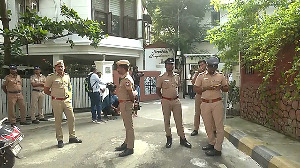The Anti-Terrorism Squad of Mumbai police on Thursday claimed that four of the six accused in the July 11 Mumbai train blasts confessed to the exact roles played by them in the incidents.
The confessions of four accused Mohammed Ali, Naved, Sajid and Majid have been recorded, ATS chief K P Raghuvanshi told reporters in Mumbai.
"The bombs were assembled at Mohammed Ali's residence at Govandi by a specialised team of Pakistani and Indian nationals. Majid facilitated the movement of six Pakistanis who crossed over to India from Bangladesh in 24 Paraganas district of West Bengal," he said.
Sajid Ansari helped the Pakistani nationals in assembling the electronic circuits used in the bombs and Naved served as the local guide for the Pakistanis, Raghuvanshi said.
Junaid, arrested from Belgaum on October 3, handled the entire support system and logistics and was among the masterminds, Raghuvanshi said.
ATS said it had also come to light during interrogations that accused Mohammed Sajid Ansari, who ran a mobile phone repair shop at Jogeshwari in Mumbai, is an active member of banned Students Islamic Movement of India and knew other accused, including Junaid and Faisal.
The investigating agency told the court that Mohammed Sajid had even attended a meeting at Faisal's Bandra house where the plan to cause a series of blasts in trains was finalised with the exact role to be played by the accused.
He actively participated in assembling the bombs by lending his expertise and knowledge of electric circuitry in making timer devices, which were used to activate the bombs, the court was informed.
The role by Mohammed Sajid was also confirmed by other accused during disclosures before the competent authority under Maharashtra Control of Organised Crime Act, the ATS remand application said and added, the remaining components and electric/electronic instruments used by him in making timer devices have been recovered at his instance and taken charge of by the police under a panchnama.
As regards the role played by Naved Hussain Khan, ATS said it had come to light that he knew co-accused Faisal since 2001 and had attended meetings between February and July 2006 called by accused Junaid in Faisal's house where the plan to set off the blasts in trains was finalised.
ATS told the court that Naved had transported Pakistani militants in Faisal's car from the places where they were accomodated to the residence of Mohammed Ali where the bombs were assembled.
Naved also drove the car loaded with bombs, and Faisal and Sajid to Faisal's residence in suburban Bandra, it claimed.
Special Judge of MCOCA Mrudula Bhatkar transferred Mohammed Majid Mohammed Shafi, Shaikh Mohammed Ali Alam Shaikh, Mohammed Sajid Ansari, Abdul Wahid Din Mohammed Shaikh and Naved Hussain Khan to judicial custody till November 9 from the custody of ATS.
Another accused Asif Khan Bashir Khan alias Junaid was remanded to police custody till November 1 by the court as ATS said it wanted to subject him to narco-analysis test.
Meanwhile, the ATS claimed that six militants from Pakistan had smuggled RDX into India which was used in the July 11 serial train blasts.
This was disclosed in the remand application filed before a MCOCA court to seek custody of the accused and is the first such disclosure by the investigating agency on the source of the explosive material used in the blasts.
Six Pakistani militants had crossed the Bangladesh border to infiltrate into India with the help of accused Majid Mohammed Shafi and they smuggled RDX which was used in the blasts, ATS told the court.
The identity of the Pakistani militants was being verified and necessary action was being taken, it said in the remand application.
ATS said accused Majid Shafi had disclosed during interrogation that he had links with militants from Pakistan and had helped them in crossing Bangladesh border several times in the past two to three years.
ATS also said Junaid was the leader of the organised crime syndicate and had links with Pakistani militants.
ATS said in remand application that the links of accused Shaikh Mohammed Ali with Pakistan's intelligence agency Inter Services Intelligence had come to light as he had undergone training in a military camp there.
However, Raghuvanshi said, "I am not an competent authority to say if the ISI was involved in the conspiracy or not."
"My role is to probe the matter and produce evidence before the court," he said to a query about the involvement of the Pakistani intelligence agency at a press conference in Mumbai.
Raghuvanshi said a more stringent law other from the Unlawful Activities Prevention Act and MCOCA would have helped the investigators as a "sustained interrogation" of the accused was very essential in such cases.
Asked if help from Interpol would be sought to nab absconding accused, he said all legal provisions would be invoked to seek the custody of Rizwan Daware and Rahil based in Saudi Arabia and London respectively who were suspected to be involved in the conspiracy.
He also exuded confidence in the "corrobarative evidence", which the ATS had apart from the confessions of the accused.





